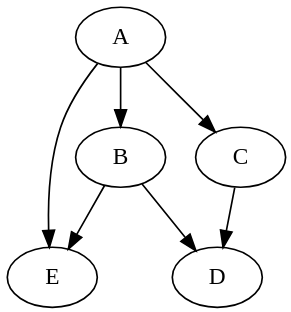A fast C++ header-only library to develop complex and parallel task dependency graphs.
Cpp-Taskflow helps you build efficient computational graphs quickly using modern C++17. It is by far faster and more expressive than existing libraries such as OpenMP Tasking and TBB FlowGraph.
The following example simple.cpp contains the basic syntax you need to use Cpp-Taskflow.
// TaskA---->TaskB---->TaskD
// TaskA---->TaskC---->TaskD
#include "taskflow.hpp"
int main(){
tf::Taskflow tf(std::thread::hardware_concurrency());
auto [A, B, C, D] = tf.silent_emplace(
[] () { std::cout << "TaskA\n"; },
[] () { std::cout << "TaskB\n"; },
[] () { std::cout << "TaskC\n"; },
[] () { std::cout << "TaskD\n"; }
);
A.precede(B); // B runs after A
A.precede(C); // C runs after A
B.precede(D); // D runs after B
C.precede(D); // C runs after D
tf.wait_for_all(); // block until all tasks finish
return 0;
}
Compile and run the code with the following commands:
~$ g++ simple.cpp -std=c++1z -O2 -lpthread -o simple
~$ ./simple
TaskA
TaskC <-- concurrent with TaskB
TaskB <-- concurrent with TaskC
TaskDCpp-Taskflow has very expressive, easy-to-use, and robust API to implement complex dependency graphs. Most applications are developed through the following three steps.
To start a task dependency graph, create a taskflow object and specify the number of working threads in a shared thread pool to carry out tasks.
tf::Taskflow tf(std::max(1u, std::thread::hardware_concurrency()));Create a task via the method emplace and get a pair of Task and future.
auto [A, F] = tf.emplace([](){ std::cout << "Task A\n"; return 1; });Or create a task via the method silent_emplace, if you don't need a future to retrieve the result.
auto [A] = tf.silent_emplace([](){ std::cout << "Task A\n"; });Both methods implement variadic templates and can take arbitrary numbers of arguments to create multiple tasks at one time.
auto [A, B, C, D] = tf.silent_emplace(
[] () { std::cout << "Task A\n"; },
[] () { std::cout << "Task B\n"; },
[] () { std::cout << "Task C\n"; },
[] () { std::cout << "Task D\n"; }
);Once tasks are created in the pool, you need to specify task dependencies in a
Directed Acyclic Graph (DAG) fashion.
The class Task supports different methods for you to describe task dependencies.
Precede: Adding a preceding link forces one task to run ahead of one another.
A.precede(B); // A runs before B.Broadcast: Adding a broadcast link forces one task to run ahead of other(s).
A.broadcast(B, C, D); // A runs before B, C, and D.Gather: Adding a gathering link forces one task to run after other(s).
A.gather(B, C, D); // A runs after B, C, and D.Linearize: Linearizing a task sequence adds a preceding link to each adjacent pair.
tf.linearize(A, B, C, D); // A runs before A, B runs before C, and C runs before D.There are three methods to carry out a task dependency graph, dispatch, silent_dispatch, and wait_for_all.
auto future = tf.dispatch(); // non-blocking, returns with a future immediately.
tf.dispatch(); // non-blocking, no returnOnly when all tasks are complete does the call to wait_for_all return.
tf.wait_for_all();Concurrent programs are notoriously difficult to debug. We suggest (1) naming tasks and dumping the graph, and (2) starting with single thread before going multiple. Currently, Cpp-Taskflow supports GraphViz format.
// debug.cpp
tf::Taskflow tf(0); // force the master thread to execute all tasks
auto A = tf.silent_emplace([] () { /* ... */ }).name("A");
auto B = tf.silent_emplace([] () { /* ... */ }).name("B");
auto C = tf.silent_emplace([] () { /* ... */ }).name("C");
auto D = tf.silent_emplace([] () { /* ... */ }).name("D");
auto E = tf.silent_emplace([] () { /* ... */ }).name("E");
A.broadcast(B, C, E);
C.precede(D);
B.broadcast(D, E);
std::cout << tf.dump();Run the program and inspect whether dependencies are expressed in the right way.
~$ ./debug
digraph Taskflow {
"A" -> "B"
"A" -> "C"
"A" -> "E"
"B" -> "D"
"B" -> "E"
"C" -> "D"
}There are a number of free GraphViz tools you could find online to visualize your Taskflow graph.
 Taskflow with five tasks and six dependencies, generated by Viz.js.
Taskflow with five tasks and six dependencies, generated by Viz.js.
While Cpp-Taskflow enables the expression of very complex task dependency graph that might contain thousands of task nodes and links, there are a few amateur pitfalls and mistakes to be aware of.
- Having a cycle in a graph may result in running forever.
- Trying to modify a dispatched task can result in undefined behavior.
- Touching a taskflow from multiple threads are not safe.
The current version is known to work on most Linux distributions and OSX. We havn't found issues in a particular platform. Please report to us if any.
To use Cpp-Taskflow, you only need a C++17 compiler:
- GNU C++ Compiler G++ v7.2 with -std=c++1z
- Clang 5.0 C++ Compiler with -std=c++17
Cpp-Taskflow uses CMake to build examples and unit tests. We recommend using out-of-source build.
~$ cmake --version # must be at least 3.9 or higher
~$ mkdir build
~$ cmake ../
~$ make Cpp-Taskflow uses Doctest for unit tests.
~$ ./unittest/taskflowThe folder example/ contains a rich set of practices of how to use Cpp-Taskflow.
- Report bugs/issues by submitting a Github issue.
- Submit contributions using pull requests.
- Live chat and ask questions on Gitter.
- Tsung-Wei Huang
- Chun-Xun Lin
- You!
Copyright © 2018, Tsung-Wei Huang, Chun-Xun Lin, and Martin Wong. Released under the MIT license.

